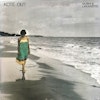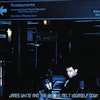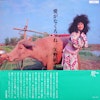Mushi and Lakansyel’s Koté Ou? is a unique record—not just within the pantheon of jazz-fusion records, and not just in the pantheon of records made in Haiti, but even within the body of work of the musicians who created it. It’s guided more by a wistful mood, almost like a tone poem, than by the usual jazz-fusion goals of rocking the house and displaying ferocious virtuosity (even though the players involved are plenty capable of both).
So, a little background is in order. Mushi Widmaier, born Ronald Gousse-Widmaier, is a brilliant and accomplished pianist-keyboardist-composer who, along with his half-brother, drummer/vocalist Joel Widmaier, formed the core of Zéklè (“Lightning”), a band that emerged in the early ’80s with the radical mission to reform popular Haitian music from top to bottom, banishing most standard kompa tropes and replacing them with moves gleaned from a lifelong diet of jazz, fusion, pop, rock, funk, and R&B. An audacious mission indeed, but these educated, upper-class musicians proved to have the magic formula, and their irresistible songs were instant smashes. The guys became rock stars on the back of hits that owed as much to the likes of Gino Vannelli, Weather Report, and Pat Metheny as to anything previously heard in mainstream Haitian music. As daring and progressive as Zéklè’s music was, however, there was still another dimension to Mushi’s and Joel’s artistry that even the band itself couldn’t contain. Hence this now-legendary side project.
Recorded during sessions dating as far back as 1978, Koté Ou? (“Where Are You?”) was released in late 1983 even as sessions were already underway for what would prove to be Zéklè’s defining album, 1984’s Stop. Koté Ou? is a dreamy, exotic work that adds a gentle, seductive Caribbean flavor and bite to the Metheny/Mays/ECM sound and to Joe Zawinul’s more atmospheric moments. Joel sings lead on several tracks with close band associate Ralph Boncy’s erotically poetic Creole and French lyrics adding an extra sexy charge to the proceedings. “Kalalou” is a standout track, sort of a Caribbean variation on “Maiden Voyage” that breaks off into a full-on African percussion breakdown before returning to the Herbie-like main theme.
But this is far from an in-your-face affair, being much more meditative and melancholy due to the story behind the album’s cover and title. The woman seen wandering along the seashore on the cover in a beautiful photo taken by her husband perished shortly afterwards in a car crash along with her husband who was a doctor, record collector, and Mushi Widmaier’s best friend. The album is dedicated to both, and their tragic demise explains the moody and philosophical vibe that characterizes the music heard throughout. This unique record is well worth seeking out.


